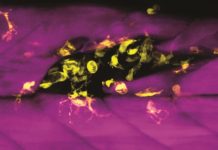 A genomic study of baldness identified more than 200 genetic regions involved in this common but potentially embarrassing condition. These genetic variants could be used to predict a man’s chance of severe hair loss. The study, led by Saskia Hagenaars and W. David Hill of The University of Edinburgh, United Kingdom, is published February 14th, 2017 in PLOS Genetics.
A genomic study of baldness identified more than 200 genetic regions involved in this common but potentially embarrassing condition. These genetic variants could be used to predict a man’s chance of severe hair loss. The study, led by Saskia Hagenaars and W. David Hill of The University of Edinburgh, United Kingdom, is published February 14th, 2017 in PLOS Genetics.
Before this new study, only a handful of genes related to baldness had been identified. The University of Edinburgh scientists examined genomic and health data from over 52,000 male participants of the UK Biobank, performing a genome-wide association study of baldness. They pinpointed 287 genetic regions linked to the condition. The researchers created a formula to try and predict the chance that a person will go bald, based on the presence or absence of certain genetic markers. Accurate predictions for an individual are still some way off, but the results can help to identify sub-groups of the population for which the risk of hair loss is much higher.
The study is the largest genetic analysis of male pattern baldness to date. Many of the identified genes are related to hair structure and development. They could provide possible targets for drug development to treat baldness or related conditions.
Saskia Hagenaars, a PhD student from The University of Edinburgh’s Centre for Cognitive Ageing and Cognitive Epidemiology, who jointly led the research, said: “We identified hundreds of new genetic signals. It was interesting to find that many of the genetics signals for male pattern baldness came from the X chromosome, which men inherit from their mothers.”
Dr David Hill, who co-led the research, said: “In this study, data were collected on hair loss pattern but not age of onset; we would expect to see an even stronger genetic signal if we were able to identify those with early-onset hair loss.”
The study’s principal investigator, Dr Riccardo Marioni, from The University of Edinburgh’s Centre for Genomic and Experimental Medicine, said: “We are still a long way from making an accurate prediction for an individual’s hair loss pattern. However, these results take us one step closer. The findings pave the way for an improved understanding of the genetic causes of hair loss.”
[the_ad id=”13203″]
Source: Saskia P. Hagenaars, W. David Hill, Sarah E. Harris, Stuart J. Ritchie, Gail Davies, David C. Liewald, Catharine R. Gale, David J. Porteous, Ian J. Deary, Riccardo E. Marioni. Genetic prediction of male pattern baldness. PLOS Genetics, 2017; 13 (2): e1006594 DOI: 10.1371/journal.pgen.1006594














